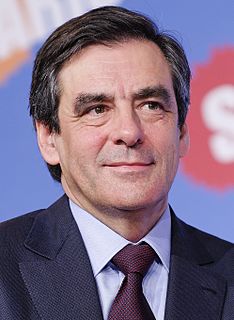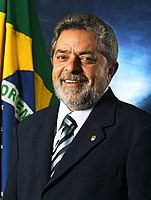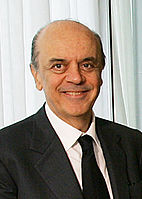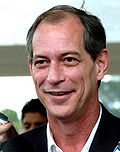
The politics of Brazil take place in a framework of a federal presidential representative democratic republic, whereby the President is both head of state and head of government, and of a multi-party system. The political and administrative organization of Brazil comprises the federal government, the 26 states and a federal district, and the municipalities.

Itamar Augusto Cautiero Franco was a Brazilian politician who served as the 33rd President of Brazil from December 29, 1992 to December 31, 1994. Previously he was Vice President of Brazil from 1990 until the resignation of President Fernando Collor de Mello. During his long political career Franco also served as Senator, Mayor, Ambassador and Governor. At the time of his death he was a Senator from Minas Gerais, having won the seat in the 2010 election.

The Green Party is a political party in Brazil. It was constituted after the military dictatorship period and, like other Green Parties around the world, is committed to establishing a set of policies on ensuring social-equity and sustainable development. One of the party's founding members was the journalist and former anti-dictatorship revolutionary Fernando Gabeira, Alfredo Sirkis and Carlos Minc. The founding of the Rio de Janeiro section of the Brazilian Green Party was led by a delegation from the southern Brazilian state of Santa Catarina, composed among others by Olga Maria Carvalho Luz, Luiz Henrique Gevaerd Odebrecht, Marcos Bayer, and Consuelo Luz Lins.
The Brazilian Social Democracy Party, also known as the Brazilian Social Democratic Party or the Party of Brazilian Social Democracy, is a centrist political party in Brazil. As the third largest party in the National Congress, the PSDB was the main right-wing opposition party against the left-wing Workers' Party (PT) administrations of Luiz Inácio Lula da Silva and Dilma Rousseff from 2003 to 2016.

The Democratic Labour Party is a social democratic political party in Brazil.

José Serra is a Brazilian politician who has served as a Congressman, Senator, Minister of Planning, Minister of Health, Mayor of São Paulo, Governor of São Paulo state, and Minister of Foreign Affairs of Brazil.

The Brazilian Socialist Party is a political party in Brazil. It was founded in 1947, before being abolished by the military regime in 1965 and re-organised in 1985 with the re-democratisation of Brazil. It elected six Governors in 2010, becoming the second largest party in number of state governments, behind only PSDB. In addition to that, it won 34 seats in the Chamber of Deputies and three seats in the Senate, besides having been a member of the For Brazil to Keep on Changing coalition, which elected Dilma Rousseff as President of Brazil.
Brazilian history since 1985 is the contemporary epoch in the history of Brazil, beginning when civilian government was restored after a 21-year-long military regime established after the 1964 coup d'état. The negotiated transition to democracy reached its climax with the indirect election of Tancredo Neves PMDB by Congress. Neves belonged to Brazilian Democratic Movement Party, an opposition party that had always opposed the military regime. He was the first civilian president to be elected since 1964.

The French legislative elections took place on 10 June and 17 June 2007 to elect the 13th National Assembly of the Fifth Republic, a few weeks after the French presidential election run-off on 6 May. 7,639 candidates stood for 577 seats, including France's overseas possessions. Early first-round results projected a large majority for President Nicolas Sarkozy's UMP and its allies; however, second-round results showed a closer race and a stronger left. Nevertheless, the right retained its majority from 2002 despite losing some 40 seats to the Socialists.
The Democrats is a political party in Brazil. It was founded in 1985 under the name of Liberal Front Party from a dissidence of the defunct PDS, successor to the ARENA, the official party during the military dictatorship of 1964–1985. It changed to its current name in 2007. The original name reflected the party's support of free market policies, rather than the identification with international liberal parties. Instead, the party affiliated itself to the international federations of Christian democratic (CDI) and conservative parties (IDU). The Democrats' identification number is 25 and its colors are green, blue, and white.

Presidential elections were held in Brazil in 1989. They were the first direct presidential elections since 1960, the first to be held using the two-round system and the first to take place under the 1988 constitution.

The Brazilian presidential election was held in 2010 with two rounds of balloting. The first round was held on October 3 along with other elections as part of the 2010 general election. As no presidential candidate polled 50 percent of the vote on October 3, a runoff was held on October 31 between Dilma Rousseff and José Serra: Rousseff won with 56% of the second round vote.

General elections were held in Brazil on 4 October 1998, with a second round on 25 October. In the first round Fernando Henrique Cardoso was re-elected President and the governorships of 14 states were elected, in addition to all seats in the Chamber of Deputies and Legislative Assemblies, and one third of the seats in the Federal Senate. In the second round the governorships of 12 states and the Federal District were defined. This election was marked by the use of voting machines for the first time ever. They would have been used in all municipalities two years later, in the 2000 local elections.
The history of the socialist movement in Brazil is generally thought to trace back to the first half of the 19th century. There are documents evidencing the diffusion of socialist ideas since then, but these were, however, individual initiatives with no ability to form groups with actual political activism.

Plínio Soares de Arruda Sampaio was a Brazilian intellectual and political activist, who was affiliated with the Partido Socialismo e Liberdade (PSOL). He ran as a candidate for the presidency of the Federative Republic of Brazil in 2010.

General elections were held in Brazil on 1 October 2006 to elect all seats in the Chamber of Deputies, one-third of the Federal Senate, and members of the Legislative Assemblies of the 26 states and the Federal District. As no candidate for president received over 50% of the vote, a second round run-off was held on 29 October between incumbent Luiz Inácio Lula da Silva and his challenger, Geraldo Alckmin. A second round was also required in 10 states where no candidate for governor received a majority. Lula won the second round with over 60% of the valid votes and secured a new four-year term.

The Socialist Party is a social-democratic political party in France, and was for decades the largest party of the French centre-left. The PS used to be one of the two major political parties in the French Fifth Republic, along with the Republicans. The Socialist Party replaced the earlier French Section of the Workers' International (SFIO) in 1969, and is currently led by First Secretary Olivier Faure. The PS is a member of the Party of European Socialists (PES), the Socialist International (SI) and the Progressive Alliance.

Events from the year 2002 in Brazil




























